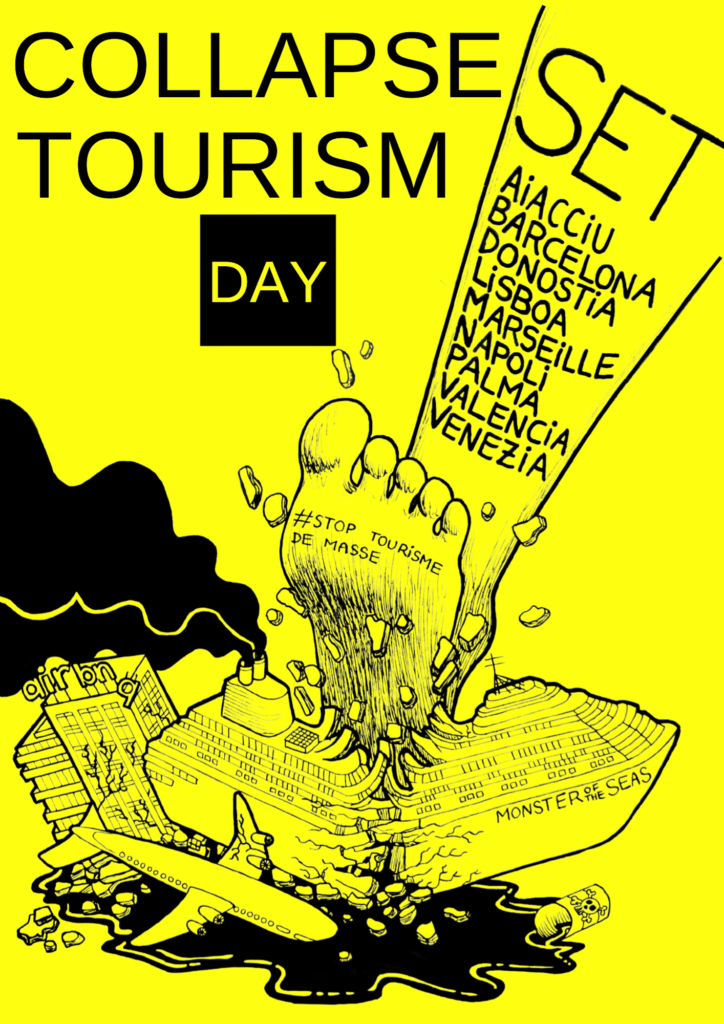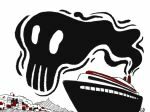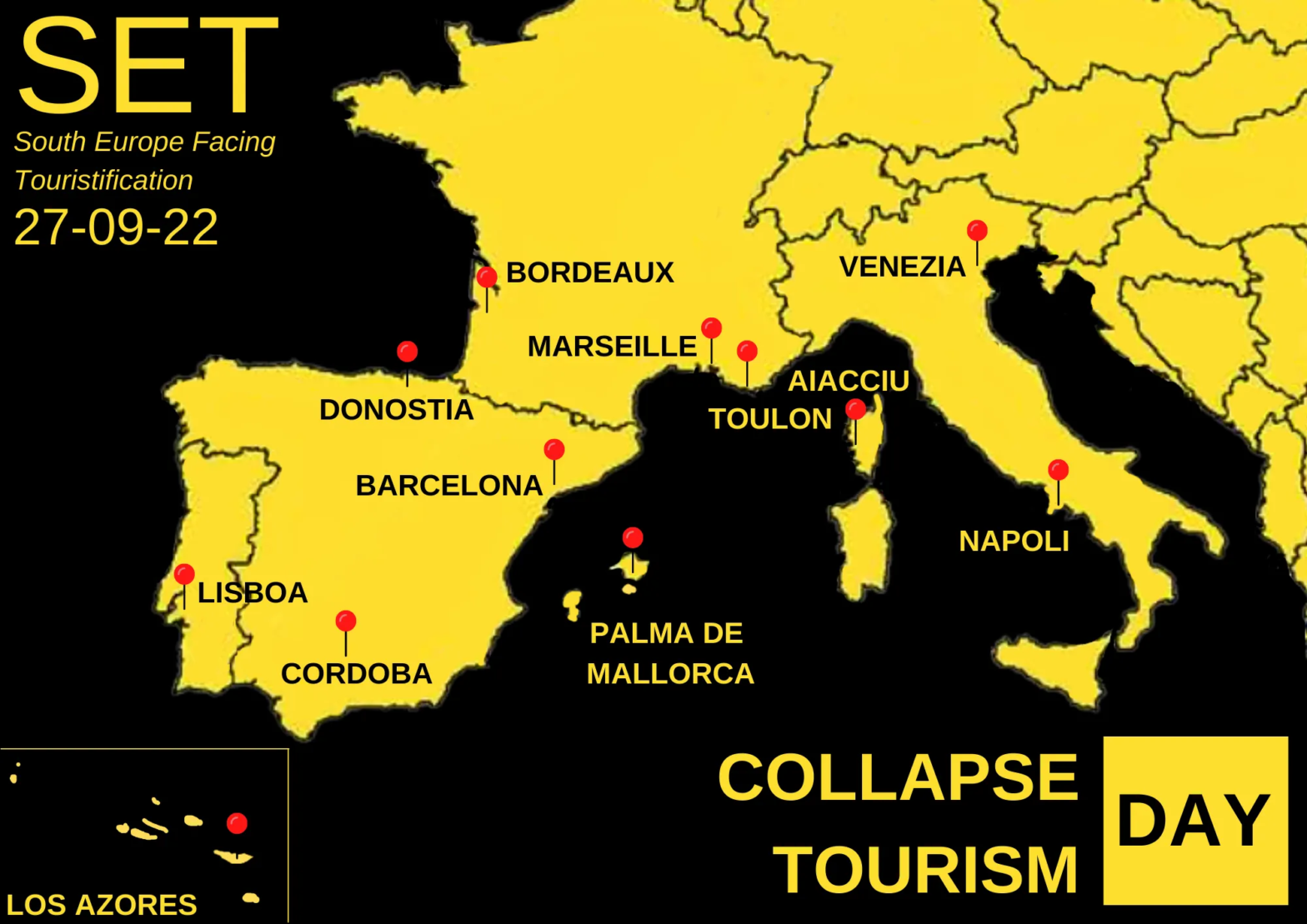WORLD TOURISM DAY = TOURISM DAY COLLAPSE
Our cities, neighborhoods, climate, health, our lives are not for sale
#Stopautourismedemasse
Several cities in southern Europe appeal on the occasion of World Tourism Day. The objective is to denounce the impact and the consequences of the intensification of tourism in this post-pandemic phase given the worsening of the climate and social crisis.
The Set [1] network, network of southern European cities in the face of tourism, appealed to joint action in different cities and territories for Tuesday September 27, 2022, calling for the non-celebration of International Day of the International Day Tourism and under the slogan “Collapse Tourism Day”.
The SET network is made up of different “knots” including the cities of Venice, Valence, Seville, Palma de Mallorca, Pampelune, Lisbon, Malta, Malaga, Madrid, Girona, Donostia (Saint-Sébastien), The Canary Islands, Camp de Tarragona, Cordoba, Barcelona and Marseille. This network was created during spring 2018 and then extended over the years. His goal is to unite the forces of these “knots” in order to create a critical voice on the development of tourism. Its action focused on meetings, moments of reflection and mutual learning, and on coordinated actions between the various nodes, often taking as reference the date of World Tourism Day.
After the break imposed by the pandemic, the SET network has reactivated, faced with an even harsher landscape, with the return of mass tourism comparable to the previous, if not higher, and in an even more aggressive version. While the private sector pushes its usual and cynical employment of employment to extreme, while abstaining from diversifying and rethinking economic models; Local administrations and national governments have dedicated a disproportionate part of public resources to support companies related to the tourism industry (housing and transport), many of which are large multinationals to millionaire profits, which cause serious social and economic damage, in addition to the known consequences of these climate companies.
At the same time, due to the pandemic, local administrations have facilitated the proliferation of the occupation of public space by the catering sector. These occupations of public space, which should have been temporary and remain little justified in relation to health needs, were mostly not revoked with the reduction of health risks. The growth of public space under private management (for example the terraces of bars and restaurants) means a greater marketing of urban space and larger impacts on daily life (noise, mobility …).
This summer, we attended a return of mass tourism which, in certain cases, is statistically closer to the pre-Cavid period, in others, it clearly exceeds it. This reactivates and aggravates the processes of exclusion from the local population and exploitation/precarious work for a population already very affected by the economic crisis caused by the pandemic.
In parallel, the traffic of cruise ships intensifies and the major infrastructure extension projects are resumed. This recovery is accompanied by rhetoric based on greenwashing as if the systemic crisis that we live was not a serious threat to the planet, but just a fleeting fashion. Both the public administration and the private sector use terms such as “sustainable development”, “ecological transition” or “green technologies” in a superficial and meaningful manner, and refuse to accept the fact, however, that the only durability is the decrease in tourism activity and the diversification of the economy towards production models consistent with social, cultural and environmental needs in territories and cities colonized by tourism. The undeniable climate crisis is on the agenda of all political agendas, but appears disconnected from the rest of the political measures mentioned, which follow an extractivist model, in a global framework now aggravated by wars and an imminent and unprecedented energy crisis .
For all these reasons, the SET network has once again chosen the symbolic date of World Tourism Day to call to demonstrate. This day is indeed used by lobbies and public administrations to celebrate new records and give a new positive image to a harmful industry.
Thus, Tuesday, September 27, various actions of protest and denunciation of this situation will take place in different parts of southern Europe under the slogan “World Tourism Day = World Collapse Tourism Day”, in order to denounce:
- The global effects of the intensification of tourism at the environmental and social level, common to all these territories and cities,
- The investment of public money in the promotion and rescue of a lucrative private activity which generates and aggravates social inequalities,
- The climate impact of this activity based on the excessive consumption of goods and services,
- The spiral of dependence on the tourism sector which generates an excessive vulnerability of local economies,
- The gradual loss of our neighborhoods and relational spaces, more and more merchandized,
- The growing precariousness of workers in the sector, especially in seasonal jobs
- Damage generated by the support of this activity in the current context of global crisis and shortage of energy resources,
- Total disconnection between climate emergency declarations and daily policies, despite the call to sobriety of several European countries.
Faced with all this, cities and territories, as well as the social entities that make up these spaces, come together again to ask:
- A concrete commitment to limit the number and size of the spaces dedicated to tourism, and to reduce the flow of passengers in ports and airports,
- The final judgment of any expansion of port and airport infrastructure,
- A real commitment to rethink tourism in light of climate change, which involves less trips and the relocation of more diverse local production,
- active policies against gentrification, commodification of spaces and the expulsion of residents,
- The commitment to find an economic balance in the territories currently dependent on tourism activity, and to support conversion to other sectors of people who work in a precarious manner in tourism.

[1] SET : South Europe Facing Touristification

